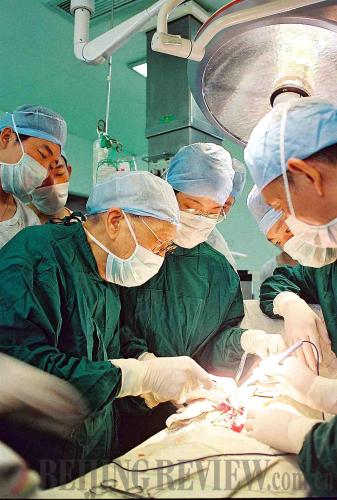|
 |
|
SAVING LIFE: Doctors operate on a patient. The first on the left is the late Qiu Fazu, one of the founders of organ transplantation in China (XINHUA) |
For 33 years, a woman surnamed Feng lived an uneventful life in the countryside of Rizhao City, east China's Shandong Province. Handicapped since her youth, Feng had limited mobility and was only able to complete schooling through her junior year at the local middle school. Before she passed away, Feng made an extraordinary decision: She would donate her organs after she died.
Feng had thought about becoming an organ donor after watching a special on TV, said Zheng Shitang, Feng's husband.
Last year, Feng was diagnosed with pneumonia. "The hunchback that had handicapped her when she was young gradually turned into an S-shape, pressing up against her lungs and triggering pulmonary disease," Zheng said.
Hospitalized in the last days of her life, Feng told her husband she wanted to donate her organs to medical research when she passed away.
She said in her will: "Since I have suffered so much pain, I want to donate my body to medicine so that others are not tortured by the same disease. After I pass away, I would like to donate all my usable organs so my life can continue in other people."
Zheng objected to the decision at first, but was later convinced, because, he said, this was his wife's last wish and he could not let her leave with regret.
On February 18, Feng passed away. The same day, staff from the Shandong Provincial Red Cross Society came to the hospital to handle the organ donation procedures.
Now Feng's kidneys, liver and corneas have saved three lives, and let two visually impaired people regain sight, said Qilu Evening News, a local newspaper in Shandong.
Dire situations
Feng's decision is unusual in China. Statistics from the Ministry of Health (MOH) show in 2010, fewer than 100 people in China donated organs.
To facilitate organ donation, the government has piloted a human organ donation program in 11 provinces and municipalities since March 2010. The Red Cross Society of China has been entrusted with the administration of donation.
Over the past year, only 37 Chinese citizens donated organs under the pilot program, said the Red Cross Society of China.
Every year, about 1.5 million patients in China need organ transplants, including 1 million in need of kidneys, 300,000 in need of livers and 200,000 in need of hearts, lungs, spleens and pancreases, according to the MOH.
These patients are usually in serious condition, and can only be cured through organ transplants. Currently, 163 hospitals in China can carry out organ transplant operations.
Many die during the waiting process. Yang Yuguo, a 32-year-old man in central China's Henan Province, was diagnosed with late-stage cirrhosis three years ago. His family hoped to save his life through a liver transplant. They waited for nearly a year, but no liver was available. Early this year, Yang died of gastrointestinal hemorrhage.
Zhang Shuijun, an expert in liver surgery and Vice President of the No.1 Affiliated Hospital of Zhengzhou University in Henan, told Dahe Daily, a local newspaper, five to seven patients whom he had treated died every year while waiting for available livers.
Zhang also said last year, 400 kidney transplant operations were performed in Henan, while more than 10,000 patients there were still waiting for available kidneys.
| 